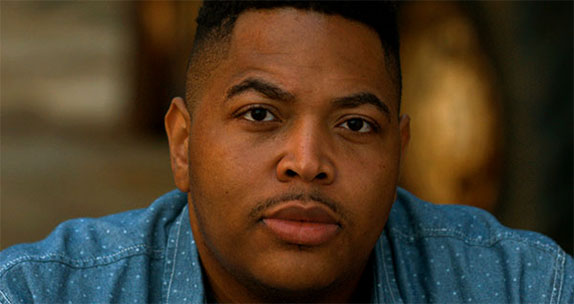
Darius Clark Monroe’s own evolution from loving son, to incarcerated criminal, and then back to student and filmmaker, is quite a journey. In his documentary Evolution of a Criminal, he points the camera at himself to revisit the people affected by the bank robbery he committed as a teenager, a decision borne out of economic desperation. The film, executive-produced by Spike Lee, premieres on Independent Lens tonight at 10pm [check local listings]. The Hollywood Reporter‘s Frank Scheck wrote: “Documentary filmmakers often turn to their own lives for inspiration, but few have as compelling a story to mine as Darius Clark Monroe… While the film could have been an exercise in self-justification, it instead offers no excuses, only explanations.”
The busy filmmaker, who has also made numerous shorts (including this one), answered a few questions about the film, on the eve of the premiere.
Why did you want to make Evolution of a Criminal, to revisit this part of your life on film?
The idea to make this documentary came to me during my third year in the grad film program at NYU. I was actually at a bank, making a deposit, when I thought someone was going to come inside and rob it. I stood in line filled with anxiety because I thought this day would be the day of reckoning. I believe in karma and I just knew that I was going to one day experience being on the other side of a shotgun.
Fortunately, the robbery was a figment of my imagination, but the feeling, the anxiety never went away. I thought about the customers in the bank the day I participated in a robbery a decade prior. I wondered about their experience and was ashamed that so many years had gone by without an apology.
I spoke with Daniel Patterson, my best friend/former classmate, and our cinematographer, and informed him of what I wanted to do. I also spoke with my parents and explained that I wanted to investigate how I, at 16, found myself deeply embedded within the American criminal justice system when a year prior, I had hopes for college with the dream of one day being an architect.
This film is an exploration of the behavioral, familial, and systemic influences that pushed me to make the decision to rob a bank, and the long lasting impact of that choice.
What were some of the challenges that arose for you in the making of this personal film?
Most creatives tend to be emotional. I’m no different. I’d fooled myself into thinking that I had become emotionally detached from the events that occurred ten years prior, but that was far from the truth. The biggest challenge was having to relive everything. It felt like time had collapsed and I was back in 1997. I had assumed that I was emotionally ready to embark on this journey of self-discovery. I was not.
How did you gain the trust of the subjects in Evolution of a Criminal?
The majority of the subjects featured in the film are family members. The trust was already built in. I have tremendous respect and admiration for all of the individuals interviewed in this project. They knew that I was not going to exploit, falsify statements, or manipulate them in any way. I was on the hunt for the truth and they were committed to the same goal. My subjects also knew that I, too, was a subject and that I’d be just as open and vulnerable in my interviews.
Tell us about a scene in the film that especially moved or resonated with you.
Every scene where I’m interacting with or interviewing one of the customers in the bank (victims) moves me. I’m still incredibly humbled and truly blown away by their kindness, their compassion, and generosity. It took a lot to ask for forgiveness, but I never expected to be forgiven. Those scenes show the resilience of the human spirit. I’m left feeling hopeful each time I experience them.
What do you hope viewers can connect with in seeing Evolution?
Evolution of a Criminal is a universal film. The majority of this country lives paycheck to paycheck. The financial struggle that my family experienced is an American struggle. We’d like to believe that most people wouldn’t go to the extent of committing a crime to help ease that burden, but I’m of the belief that it’s more common than advertised.
Was there anything you couldn’t get done when you were making your film?
I didn’t get married, have children, or buy a house. One day, I’d like to accomplish all three, but who knows… Film is a jealous and selfish lover.
What are your three favorite films?
Jurassic Park, The 400 Blows, Do the Right Thing.
Do you have any advice for other aspiring filmmakers?
Do you really want to do this? Like REALLY want to do this…? If you’re not passionate about filmmaking, not about film watching, there’s no need to waste anymore time fooling yourself. The work is painfully hard but incredibly rewarding, but you have to want it like you’ve never wanted anything else. You have to be okay with not seeing family and friends. You have to be okay with being broke. You have to be okay with rejection. Be okay with not knowing what your future will look like. You have to be a dreamer and be realistic at the same time.
Bonus:
Hear Monroe interviewed by CBC (Canada) Radio.
See Monroe talking about the film on MSNBC:




